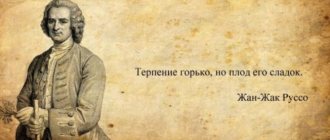Music and soul
Quotes about music and the soul reflect the idea of the close connection between music and the state of harmony that it evokes in us. It is impossible not to succumb to her influence, not to follow her. Music is the tuning fork of our soul, the most obvious indicator of our state of mind. It cleanses and awakens our heart, opens it to goodness and light.
“I don’t listen to music, I listen to my soul.”
Marina Tsvetaeva
“Music shows a person the possibilities of greatness that exist in his soul.”
Ralph Waldo Emerson
“God gave us music so that, first of all, we would be drawn upward by it...”
Friedrich Nietzsche
“Music is the only universal language, it does not need to be translated - soul speaks to soul in it.”
“Music washes away the dust of everyday life from the soul.”
Bertold Averbakh
“Music, like rain, seeps into the heart drop by drop and revives it.”
Romain Rolland
“There is something magical about rhythm: it makes us believe that the sublime belongs to us.”
Johann Wolfgang von Goethe
“Just as gymnastics straightens the body, so music straightens the human soul.”
Vasily Alexandrovich Sukhomlinsky
“Only the greatest art – music – can touch the depths of the soul.”
Maksim Gorky
Tell me what you're listening to and I'll tell you who you are
It so happened that today society is increasingly fragmented into various subcultures tied to certain styles and genres of music. And each such social group has its own specific behavior patterns, unspoken rules or even laws. A person who considers the song “Alcoholic” to be the height of perfection will, with minimal probability, turn out to be a highly educated, cultural and creatively developed person. And from an informal person with KiSh in headphones, society will habitually expect some kind of protest behavior and actions that do not fit into the concepts of norm and adequacy.
The music that a person listens to makes it possible, at least based on existing stereotypes, to create a certain image. And this is even stronger in us than visual perception - often we are ready to forgive a person’s external shortcomings, but an avid theatergoer and opera lover is unlikely to feel comfortable communicating with even the most beautiful fan of Nagovitsyn or Shufutinsky in the world. As well as vice versa - it is unlikely that fans of chanson will find it interesting to communicate with the same theatergoer, because they will find this communication extremely boring.
But it should be noted that it is not music that shapes our character, but rather the opposite - due to certain internal qualities, personal associations, individual perception, we choose a certain melody. And this is uncontrollable no matter how hard you want. Our choice of music is only a reflection of our soul. This is what our soul wants to convey to the world around us. But it can also be used as an element of education at a certain age!
Music is the language of the soul
Isaeva N.A. SHI No. 2
Music is the language of the soul
From the depths of centuries, ancient myths came to us, which were created by folk imagination. The ancient Greeks believed that on the top of the sacred Mount Parnassus, beautiful girls - nine daughters of the lord of the gods Zeus - gathered for festivities. Each muse was in charge of one or more arts. Standing in a circle, the muses danced and sang to the sounds of the golden cithara. The voices of the girls merged into a harmonious choir, and all nature, as if enchanted, listened to the sweet melodies.
The ancients were unable to understand how certain phenomena arose and explained everything by the incomprehensible will of the gods. Over time, people came to the idea that art is a special form of reflecting reality in people's minds. Art was not born by chance. It has always sowed seeds of goodness and beauty. Art always brings people the joy of knowledge, calls to thought, to empathy for what they see and hear. No art has such a powerful charge of emotion as music, because it mainly appeals to people's feelings. Music, with one combination of sounds, can evoke any experience in people.
The art of music is the art of organized, orderly sounds. They have a certain pitch, rhythm, harmony, timbre. These sounds do not imitate the sounds of nature in their pure form, but are arranged into a scale by the composer according to simple but very precise rules. These sound combinations convey the state of mind of a person listening to the sound of the wind or the sea surf. “Music takes possession of our feelings before the mind comprehends it,” said Romain Roland. In music, especially in its complex genres, for example in a symphony, it is possible to display a very broad picture of reality, although the composer and performer do not use an artist’s brush or a sculptor’s chisel. The listener “figures out” what is missing, “completes” what is heard in his imagination. The sounds brought into the system can reveal to us the contrasts and contradictions of an entire era, show the joyful and sad sides of life, reproduce not only a person’s emotions, but also his character, position in society, and national traits.
However, music, this direct language of the soul, although it can express a lot, its possibilities are limited, just as the horizons of any of the arts, taken separately, are not unlimited. For all its emotionality, music is devoid of concreteness and clarity, and in order to “see” something in its sound, one must resort to the help of imagination.
Music occupies a prominent place in the system of arts; it literally permeates all the pores of our time, creating, in the words of A. Blok, “the musical pressure of the century.”
Aphorisms
In this section, we decided to publish a selection of apt statements by famous composers and musicians. We hope you find them interesting and useful.
Robert Schumann
- a real “record holder” for the number of musical aphorisms. He is the author of several dozen catchphrases, which he called “Life Rules for Musicians.” Here are some of them:
- Hearing development is the most important thing. Try to recognize tonalities and individual sounds from a young age. A bell, a windowpane, a cuckoo - listen to the sounds they make.
- Play rhythmically! The playing of some virtuosos is similar to the gait of a drunk. Don't take them as an example!
- Don't be afraid of words: theory, general bass, counterpoint, etc.; they will greet you warmly if you do the same.
- Never strum! Always cheerfully play the piece to the end and never give up halfway through.
- Try to play easy pieces well and beautifully; this is better than performing difficult ones mediocrely.
- It is necessary that not only your fingers master the piece, you must be able to hum it to yourself without an instrument. Sharpen your imagination so much that you can retain in your memory not only the melody, but also the harmony associated with it.
- Always take care to keep your instrument tuned clean.
- Try, even if you have a small voice, to sing from sight without the help of an instrument; the subtlety of your hearing will constantly increase from this. If you have a good voice, don’t hesitate a minute and develop it; consider this as the most beautiful gift that heaven has given you.
- If you are asked to sight-play an unfamiliar composition, then skim it first.
- You can never raise a child to be a healthy person on sweets, cookies and candies. Spiritual food, just like physical food, should be simple and healthy. The great masters took sufficient care of such food; stick to it.
- Consider it disgraceful to change anything in the works of good composers, omit them, or, what’s more, add newfangled embellishments to them. This is the greatest insult you can give to art.
- Never miss an opportunity to play together in duets, trios, etc. This will give your playing freedom and liveliness. Accompany singers more often.
- Look among your comrades for those who know more than you.
- Sing hard in the choir, especially the middle voices. This will develop your musicality.
- Start early to pay attention to the sounds and character of various instruments; try to thoroughly imprint their unique sound coloring in your auditory memory.
- Never miss an opportunity to listen to a good opera.
- Observe life carefully and also become familiar with other arts and sciences.
- Without enthusiasm, nothing real is created in the artificial.
- Only when the form becomes clear to you will the content become clear to you.
- There is no end to learning.
- At all times there have been bad composers and fools who praised them.
- If you have to play in front of someone, don't break down; do it right away or give up right away.
- Don't think that old music is outdated. Like a beautiful, truthful word, beautiful, truthful music can never become outdated.
...And a few more apt statements written by different authors:
- Playing fast is easier than playing slowly.
(W.A. Mozart)
- The pauses between notes are where the art resides.
(A. Schnabel)
- The performer's stupidity is nowhere more obvious than in the pauses.
(N. Perelman)
- Sing while you play.
(A. Toscanini)
Many musicians are familiar with the name Karl Czerny
- the author of a huge number of etudes, a true master of the art of playing the piano. In his “Complete Theoretical and Practical Piano School,” the composer very accurately defined the nature of each of the dynamic shades. Think about these statements - perhaps they will help you think more carefully and more creatively about the simplest musical terms!
- when performing pianissimo ( pp ), the keys are touched as lightly as possible so that the playing does not lose clarity: pp has a mysterious, mystical character and, when performed perfectly, can give the listener the enchanting impression of music or echo sounding from afar;
- piano ( p ) means meekness, calm indifference or quiet sadness, the essence of the piano is conveyed by a soft and gentle, but more defined and expressive touch on the keys;
- forte ( f ) conveys power, independence and determination, but within the framework of favorable, without exaggeration, passion;
- fortissimo ( ff ) expresses the growth of joy to exultation, grief to fury, brilliance to bravura.
SocButtons v1.6





